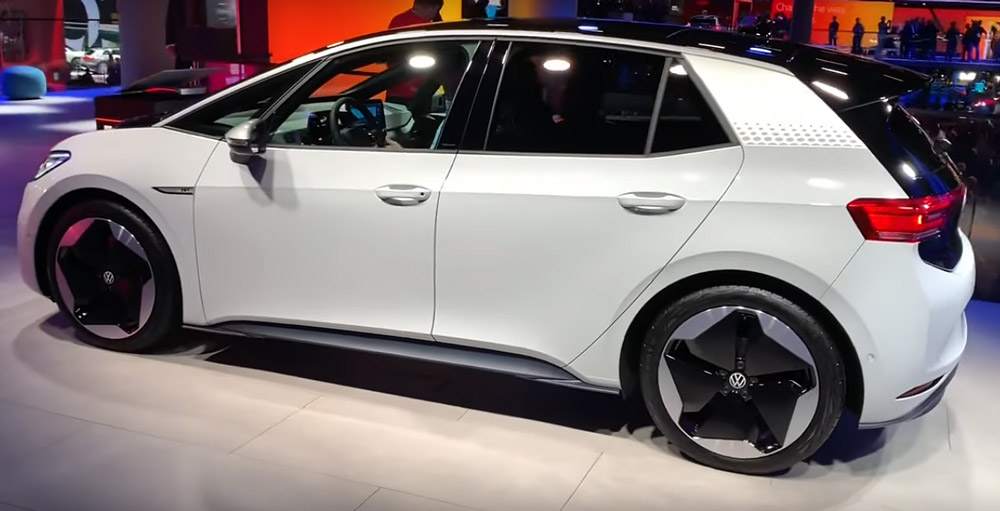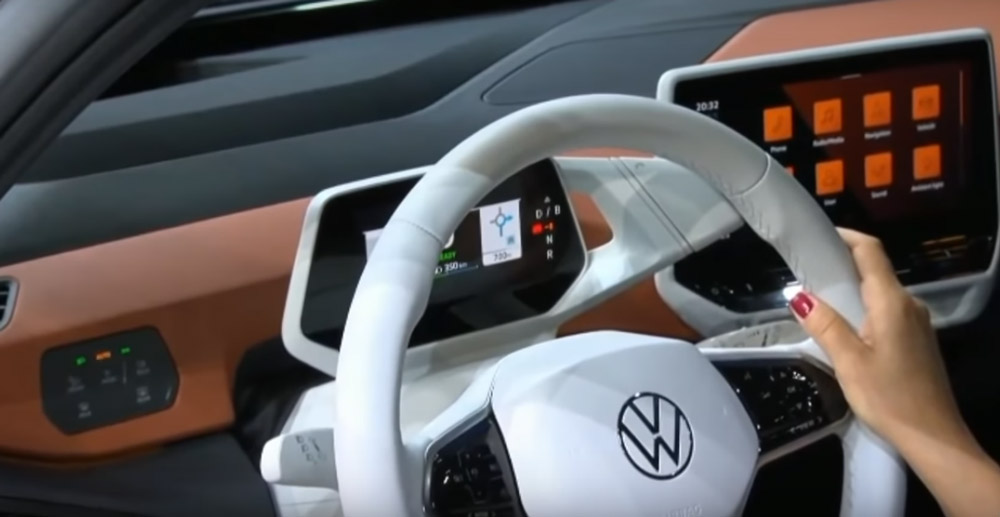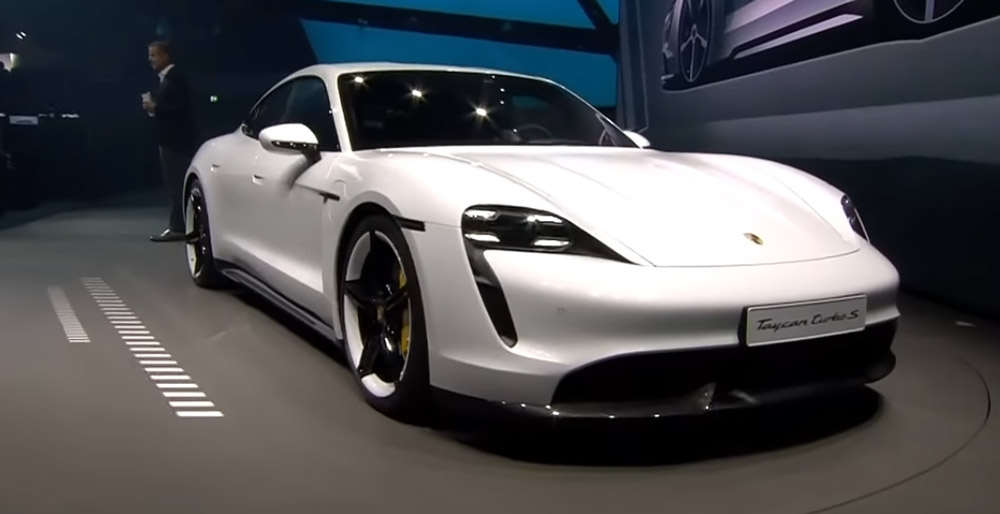Two cars hogged the limelight at the 2019 Frankfurt Motor Show. Both were electric cars made by the VW Group. In this post, we look at why that’s a big deal.
As always, the 2019 Frankfurt Motor Show played host to mildly tweaked versions of old favourites, outrageously expensive hypercars and wacky concept vehicles. Yet it was hard to escape the feeling that something was different about this year’s show. The winds of change are blowing through the car industry and Frankfurt felt like the first strong gusts.
We’re talking, of course, about the shift away from petrol and diesel-fueled cars and towards full electrification.
Not that there weren’t plenty of conventionally powered vehicles at Frankfurt — we covered some of them in Part One of our report. It’s more that the buzz and the press attention were focused on two new all-electric offerings from Volkswagen and Porsche.
So why all the fuss? Let’s look at each in turn.
Volkswagen ID.3

Even the strongest critic of electric cars would have to admit that they’ve got a number of practical advantages: they’re cheaper to run, attract less road tax, avoid emissions charges and are quieter than fossil-fuel equivalents. As for the environmental arguments…well, we’ll sidestep those for this article!
But along with the day-to-day benefits of electric vehicles come a laundry list of disadvantages. Up until now, it’s been hard for Joe or Jill Average to find an electric car that doesn’t suffer from one or more of the following: not enough range, too slow, too ugly, too niche or too expensive.
Take the Tesla Model 3, for example. There’s no doubt that it’s a hell of a car, even impressing the arch-EV-sceptics at Top Gear. With the BMW 3 firmly in its sights, the Tesla offers good looks, massive performance, space-age tech and impressive range. But on the other hand, it’s also a whacking big saloon and it’s made by a company that’s still fairly unknown in the UK. Oh, and prices start at just over £37,000.
Other electric cars currently available (pun intended) in the UK suffer from equally intractable problems. BMW i3? Hugely overpriced. Nissan Leaf? Dull as daytime TV. And so on and so forth.
The Volkswagen ID.3 has been designed to change all that. It’s VW’s first shot at producing a genuine mass market electric car. And the headline figures are persuasive. Range starts at 205 miles for the base model, rising to 342 miles for the top variants. Fast charging, where available, will add up to 180 miles in 30 minutes. Though the performance figures haven’t been released, with 201 bhp and the instant torque of an electric motor, the ID.3 isn’t going to be slow. But where things really get interesting is the all-important price — it’s going to be £25,500 for the entry-level model. When you start factoring in reduced running costs, the ID.3 starts looking genuinely competitive.

Styling is subjective, but in our eyes, VW have struck a nice balance between the familiar and futuristic, especially in the sleek interior.
Above all, perhaps its biggest selling point is that it’s a Volkswagen. For many people, electric cars are still a bit exotic and unfamiliar. That means that a familiar brand known for its rock-solid build quality has a massive head-start over less well-known rivals.
VW is planning to build 100,000 ID 3’s in 2020 — part of its strategy to sell 10 million electric vehicles over the next decade. Time will tell if there’s the public appetite for that many, but at the time of writing, pre-orders have exceeded 33,000.
Porsche Taycan

VW Group’s other electric offering at Frankfurt couldn’t be more different to the ID. 3. The Porsche Taycan Turbo* is a focused sports car, delivering face-melting performance (Turbo s: 0-62 in 2.8s, 0-124 in 9.8s) at an eye-watering price (£115,858 to £138,826).
Initial reviews are limited, but that hasn’t stopped 30,000 well-heeled punters pre-ordering one. We can understand why. Apart from the staggering performance, just look at the thing. It’s gorgeous.
We could talk about its range, features or technology, but that might miss the bigger point: this is the first proper, all-electric sports car from a major manufacturer. And it’s not from a company with a broad portfolio either, like Honda or Nissan. Nope, this is from the mighty Porsche, supercar manufacturer extraordinaire, beloved of petrolheads throughout the world. Their electric car laps the Nurburgring in 7:42 and, in a straight line, annihilates all but the very fastest petrol alternatives.
With the Taycan, Porsche have shown just what an electric car is capable of, and has thrown down the gauntlet to all other manufacturers.
But after all, it’s just two cars , isn’t it?
Now, despite all the above, let’s not get ahead of ourselves. In August 2019, just one in twelve new cars sold in the UK was electric. That’s a long way away from electric cars dominating the market anytime.
However, what the Frankfurt show demonstrated was the serious intent of one of the world’s largest auto manufacturers to embrace an electric future. The evidence wasn’t on a Powerpoint slide or in an optimistic statement from the press office. The cars were right there, in the metal. The Taycan is perhaps of more symbolic value, but the ID 3 could well be the first credible electric car for the mass market.
It looks like we’re living in interesting times!
*No, despite the name, the Taycan doesn’t have a turbo. We presume that’s Porsche’s little Teutonic joke.
The WVS blog covers a wide range of automotive topics, from the contentious to the light-hearted. We are an independent garage specialising in all the VW group marques, including Audi, Volkswagen, Skoda and SEAT. WVS provide services, repairs and MOTs, delivering a main dealer level of care at affordable prices. To book your vehicle in, or for any enquiries, get in touch.

